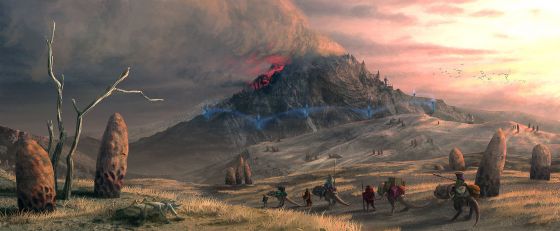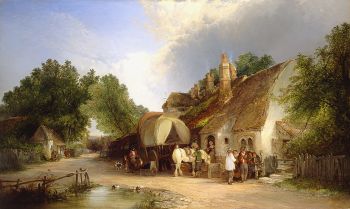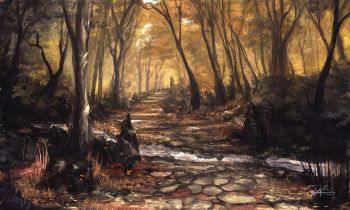Difference between revisions of "Travel"
Tao alexis (talk | contribs) |
Tao alexis (talk | contribs) |
||
| Line 92: | Line 92: | ||
== Mounted Travel == | == Mounted Travel == | ||
| + | : ''Main Articles: [[Horseback Riding (sage study)|Horseback]], [[Camelback Riding (sage study)|Camelback]]'' | ||
Revision as of 01:03, 28 April 2021
Much of the time, player characters will be troubled with the effort to go from one place to another, typically over distances that take many days. Travel creates problems that must be solved: gear must be taken along enabling sleep, prepared food and survival; mounts expedite travel but asks for skill in managing and feeding the animals; vehicles enable the transport of much material as well as opportunities for trade, but these too need care and maintenance. Water is sometimes an obstacle, so that ship travel must sometimes be tried. Weather is a constant hazard. This page makes some attempt to address many issues involved with journeying from place to place, but there are so many particulars to be discussed that for a time, the content below will need occasional updating — much of it during an actual campaign, when an unforseen issue requires an on-the-spot judgment.
Until such incarnations take place, then, this page should be treated as an outline, enabling details to be added in a constructive, organized manner.
Contents
Daybreak
Before a day's journey can start, the party will have to prepare themselves, their gear and their means of transportation. This might mean starting from a camp; or from an inn or other public house; or even from their own home. Certain tasks will apply to all three, while the conditions for the party at daybreak will also have peculiar characteristics worthy of detail.
Making & Breaking Camp
- Main Article: Making & Breaking Camp
All preparation for awaking and getting started in the outdoors begins with making camp the night before. The first concern is cooking. This must be done over a fire, which takes time to build. Wood needs to be gathered before it can be burnt. Failing to build a fire or eat hot food could mean illness from cold weather as well as parasites that are found in uncooked food.
Water needs to be gathered and animals tended. The characters will be busy with airing out their sweaty clothes, banging the dents out of their armour, sharpening their weapons, attending to repairs in equipment that wear and tear demands. Someone will need to take a walk around the camp to ensure the safety of the sight, to ensure the party hasn't settled near some large beastie's nest. Spellcasters will need time to study. Additionally, since my sage abilities are presumed to increase when a level is gained due to practice and meditation, this is also a part of settling down for the night.
Additionally, the characters will be tired. They are not machines. They will want to rest and enjoy themselves, tell stories, discuss events of the day and make plans for the morrow.
Come the next morning, these things have to be reversed. Gear must be gathered up, the fire kicked out, the tent taken down, the animals readied for travel and hitched to any vehicles the party may be using. The players must wash themselves, put on their dirty clothes, arrange their packs and insundries and stretch themselves for the journey ahead. There's a lot to do before starting off towards the next place.
Waking in a Public House
- Main Article: Lodging
Most inns or roadhouses will offer some food in the morning, usually porridge, stewed greens and hot tea or coffee. This has a charge of course. The characters will be awakened by a knock on the door that will come half-an-hour after daybreak; this is automatic and it does not matter if the characters are leaving that day or staying over. Characters who don't want breakfast may roll over and return to sleep, but they won't be allowed to make their own hot food on the premises, so if they miss this first meal they will need to seek food somewhere outside the lodging (food won't be served again until evening).
After eating, the characters will return to their room to pack up. One or more persons must visit the stable to collect the party's animals, at a maximum of two animals per person. These animals will be watered, fed and brushed when collected. The stablemaster will sometimes point out any maladies in the animals that might have been noticed. If the party has a wagon, they will have stayed overnight in a roadhouse. Inns have no place to park a wagon.
The characters must settle up any costs with the premises, paying for any damage they've done; then they must drag their things out to the open street and load their animals there. Roadhouses that sit outside city or town walls have a yard, where the animals can be hitched up and things loaded. Inns have a stable but they do not have a yard, so this must be done publicly.
Once loaded, the players must spend a little time reaching the road for travel. This can be a few yards for a roadhouse, but can require a half-hour of tortured streets when getting out of a large city.
Leaving Home
This simplifies some things; the players can sleep in, make their own breakfast and there's plenty of room for hitching the animals. However, it will be necessary to build a fire to make coffee and breakfast, and the animals will have to be watered and readied for the day's travel.
A solution, whatever the situation, is to engage servants to do some of the work. At home, a servant can have the animals ready to go before the player characters awake; their breakfast can be made ready for them, their clothes brushed and laid out, most of the necessary goods already loaded, the axle wheels greased and so on. Some of this work can be done around a camp, with servants to collect wood and water, tend the animals and get the fire started in the morning. At an inn or lodge, personal servants are less useful, as they won't be given access to the inn's kitchen, but they can still fetch the animals and harness them.
On the Road
To get out of a town or city, the party can rely on signs attached to houses or posts that will point the right way, so they may find themselves on the right road. The type of road that's found depends on the local population density and infrastructure, with intrinsic details on these matters being covered on the links given. Routes will be made of paving stone, cobbles, pounded dirt-clay or no better than grass and natural surfaces. Progressively less accessible roads will be recognized by ruts for cartwheels, heavy vegetation and the narrowness of passage.
Any intersection that includes at least one dirt road or better will have a road sign pointing the way to distant villages, towns and cities. There is little chance that these signs will go missing or lay broken at the side of the road, as there are locals who will check on their presence once per day. Every five or ten miles along cobbled and stone roads, depending on the region, there will typically be a marker telling the distance to the next down or from the last, posted on the left hand-side of the road.
Movement Pace
Understanding that player characters have a choice about how fast they can walk, or stride, we expect players to notice more if they're ambling more slowly towards their destination. There is a difference between "passing through" a wilderness and actively searching it for a lair or a dungeon. In any case, a full day's movement is considered to be 10 hours. Travelling longer than this in a day is considered a forced march, which can have detrimental effects to the character's health. In all cases, a single hour's movement can be calculated easily by dividing the full day's movement by 10.
Player characters may opt for short bursts of faster or slower movement for an hour at a time. Lesser periods are difficult to track, and so should be discouraged; all long-term movement should be calculated in hours and not minutes.
| Route | Movement per 10 hrs (miles per action point) | |||
|---|---|---|---|---|
| Ambling (str-2) |
Walking (str-3) |
Hurrying (str-4) |
Rushing (str-5) | |
| High road | 5.2 | 7.8 | 9.4 | 9.8 |
| Low road | 4.7 | 7.1 | 8.5 | 8.9 |
| Cobbled road | 4.1 | 6.1 | 7.3 | 7.6 |
| Dirt road | 3.3 | 5.0 | 6.0 | 6.3 |
| Cart track | 2.6 | 3.9 | 4.7 | 4.9 |
| Cart path | 1.9 | 2.8 | 3.4 | 3.5 |
| Path | 1.3 | 1.9 | 2.3 | 2.4 |
| Trail | 0.8 | 1.2 | 1.4 | 1.5 |
| No route | 0.5 | 0.7 | 0.8 | 0.9 |
Ambling
Ambling describes a stride-2 movement, or 10 feet per action point (AP) per round. In travel terms, with necessary rests and reliefs, calculates to 2.6 miles per hour on high roads. The ambling pace allows many stops, opportunities to speak with other travellers and locals, while giving a good sense of the region. Characters who choose to amble will remember the location of roadhouses and water sources; the names of villages; places of interest and even the names of residents. Returning to areas ambled through gives a +2 bonus to wisdom checks in locating these places and a +2 to charisma checks when speaking with residents.
When searching wide areas for unknown sites, such as a dungeon, an ambling pace is mandatory. Each individual or group can effectively search up to 42.7 acres per AP, per day; a single unencumbered person can search 213 acres in a day, while three separate parties can search a square mile of land per day. A 2-mile hex could be searched completely in a little more than 4 days.
Walking
Walking is a stride-3 movement, or 15 feet per AP per round. This is a normal travelling pace, enabling efficient progress without exhaustion. Most ordinary travellers walk at this point. It still allows friendly banter with others moving in the same direction and at the same pace, though it assumes the characters prioritize travel over gazing at the surroundings. The speed is 3.9 miles per hour on high roads. Three rests of 15-20 minutes are taken into account for the distances given. A party moving at this pace will feel moderately footsore at the day's end. Features seen along the way can be found again if the character returns to an area passed through, but without a +2 bonus to wisdom; no bonus to charisma is gained because the character didn't stop to speak to locals.
Hurrying
Hurrying is a stride-4 movement, or 20 feet per AP per round. When hurrying, the players are walking very fast or slowly jogging; they are too focused on the road surface to see much that's going on around them. Others on the road are dodged or passed. Characters moving at this speed, 5.2 miles per hour on a high road, will sweat and feel their equipment rubbing their shoulders and hips raw. A ten minute stop is needed every hour, during which time the characters will be panting and concerned with rehydrating their bodies. Stops will usually occur whenever open water is sighted. Nothing about the country passed through will be remembered if the character passes through this way again. At the end of ten hours, the character will have to sit for half an hour before they can begin to make camp.
Rushing
Rushing is a stride-5 movement, describing the character pushing his or her self to their limits. Distance is 25 feet per AP per round. While the character can run faster, up to stride-8, this is the best speed that can be maintained for hours at a time. Every hour will require 15-20 minutes of rest, or slow movement, to resist becoming stiff. Water must be drunk in copious amounts. Nothing will be remembered from the journey. Because the forward movement it offers is only slightly better than hurrying, this is a stride usually employed in times of desperation, when every minute counts to stave off disaster. At the end of ten hours, the character will be too tired to make camp until an hour of laying prone. If the character fails a constitution check, they will fall asleep for 2-3 hours, so that it may be dark before the character awakes.
Moving as a Group
Though players may wish to travel tightly together, to be ready should an encounter happen, this isn't realistic where individuals are concerned. Different persons travel at different speeds, while stopping to take a rock out of their shoe, visit the bushes, fix their gear, take a drink, follow up a thought by looking at some odd object or a book, and a hundred other distractions. Arguments that arise will also break up a party for a mile or so. We may reasonably expect a party to be in sight of one another, or at least within earshot ... and at the same time be strung out over a distance of 15 to 90 yards. If an exact calculation is needed, roll 3d6 and multiply the result by 5: this will give the present distance between the frontrunner of the party and the last in line. If the DM wishes, a modifier of -1 can be applied to the roll for the first hour in the day.
Each character can then roll a d20, with the highest numbers at the front and the lowest at the rear. Comparing the numbers against the total distance will show how relatively close each player character is to the next. For example, Liam, Garner and Rena are stretched over a distance of 50 yards. On a d20, Liam rolls a 2, Garner rolls a 15 and Rena rolls a 7. Rena is closer to Liam, at the rear, than she is to Garner at the front. Exact distances can be determined by dividing 50 by the largest roll minus the smallest: 50/(15-2) = 3.85. Therefore, Rena is 19 yards ahead of Liam and 31 yards behind Garner.
These distances are not as great as imagined. An encumbered character with 3 AP, running full out at stride-8, can cover 40 yards in a single round. Therefore, even in the worst case scenario, it would take Garner only two rounds to reach Liam or vice-versa, while Rena can reach either in less than a round. Of course, much depends on if the party is surprised, and perhaps isolated from one another by a sizable party of bandits. A possible solution to this danger is to ride on mounts, enabling greater flexibility of movement, or travel in a single vehicle where the party will always be together.


